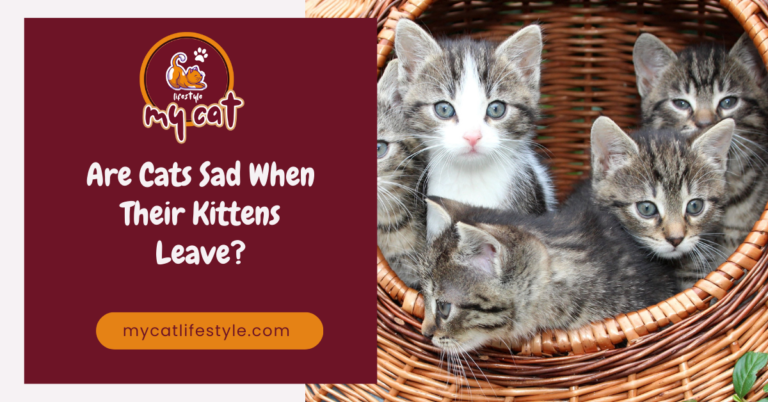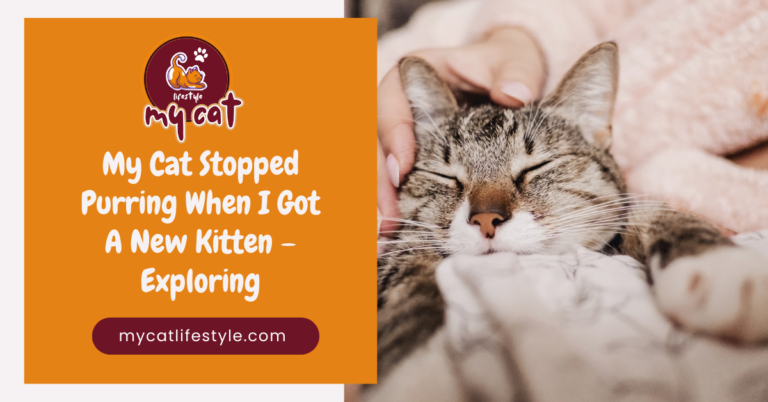Why Do Cats Move Their Kittens?
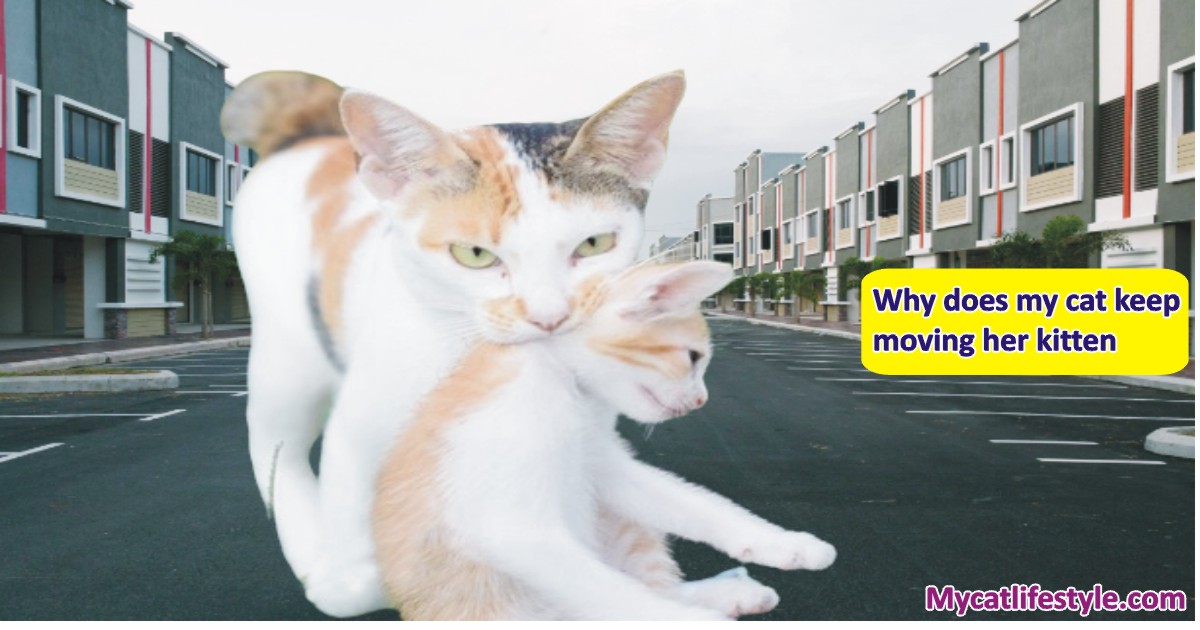
Having a cat that recently welcomed a litter of fluffy kittens into your home is both exciting and heartwarming. It’s a joy to see new life and watch as your feline family grows. However, you might notice the mother cat frequently moving her kittens from one place to another, which can be a bit puzzling.
There are several reasons why a mother cat might keep relocating her kittens. She could be seeking a quieter, more comfortable spot if the current area becomes too noisy or bustling. Additionally, she might move them to ensure they stay warm and safe from any potential threats. Teaching survival skills and keeping them away from too much attention are other reasons. Sometimes, if one kitten isn’t well, she might separate it from the rest for its safety and the health of the others. Or, she might just think the current nest isn’t clean enough and wants a fresher space for her litter.
You might try to return the kittens to their original spot, but if the mother cat moves them again, it’s her way of saying she’s not happy with that location. As someone who loves cats, understanding the mother cat’s behavior is important. That’s why it’s helpful to know all about why mother cats move their kittens. By learning more, you can find ways to assist the kittens and empathize with the mother cat’s situation. Read on to discover how to help manage this behavior and gain deeper insights into the world of mother cats and their kittens.

Is it Normal for Cats to Move Their Kittens?
Absolutely, it’s totally normal for cats to move their kittens. This behavior is deeply rooted in their instincts. Mother cats, or queens as they’re often called, are wired by nature to ensure the safety and well-being of their offspring. In the wild, the risk of predators makes it essential for a mother cat to keep her kittens hidden and safe. Even in the safety of a home, these instincts kick in.
It’s fascinating, really. The mother cat’s primary concern is the survival of her kittens. If she senses any sort of danger or disturbance, be it noise, unfamiliar scents, or the presence of other pets and people, her maternal instincts will prompt her to find a safer, more secluded spot. This behavior is a testament to the mother cat’s dedication and attentiveness towards her litter.
Moreover, cleanliness plays a part too. Cats are known for their love of cleanliness. A mother cat may move her kittens if she feels the current spot has become too dirty or if it’s too close to their feeding or litter areas. This ensures the kittens grow up in a hygienic environment, free from contaminants.So, if you notice your cat moving her kittens, it’s usually for a good reason. She’s just being an attentive and caring mom, making sure her little ones get the best start in life. Now, let’s delve into the specific reasons and nuances behind this behavior in the following sections.
My Mother Cat is Moving Her Kittens to Unsafe Places

Sometimes, cat owners might notice something odd. The mother cat seems to be moving her kittens, but not to the safe, cozy spots you’d expect. Instead, she chooses places that seem unsafe or unsuitable. This might leave you scratching your head, wondering, First off, don’t worry too much. It might seem unsafe to us, but the mother cat might have a different view on what’s safe and what’s not. However, there are a few things to consider. Mother cats can sometimes be stressed or anxious, especially if they’re in a new environment or if there’s a lot of noise and activity around them. This stress can make them behave in unpredictable ways, like choosing less-than-ideal spots for their kittens.Another point is the mother cat’s experience. If she’s a first-time mom, she might not be totally clued up on the best places to keep her kittens. It’s like she’s learning on the job, and she might make a few mistakes along the way.
But here’s what you can do. Try to create a quiet, secluded space for her and her kittens, somewhere she feels safe and undisturbed. This might encourage her to settle down with her kittens in a spot that you both agree is safe. Also, keep an eye on where she’s moving the kittens. If it’s genuinely unsafe, like near open windows or doors, it’s okay to gently move them back to a safer spot. Remember, it’s all about working together with your feline friend to ensure the kittens grow up healthy and happy. In the next sections, we’ll explore more about this intriguing maternal behavior and how you can help your cat make the best choices for her furry family.
Why Do Cats Move Their Kittens
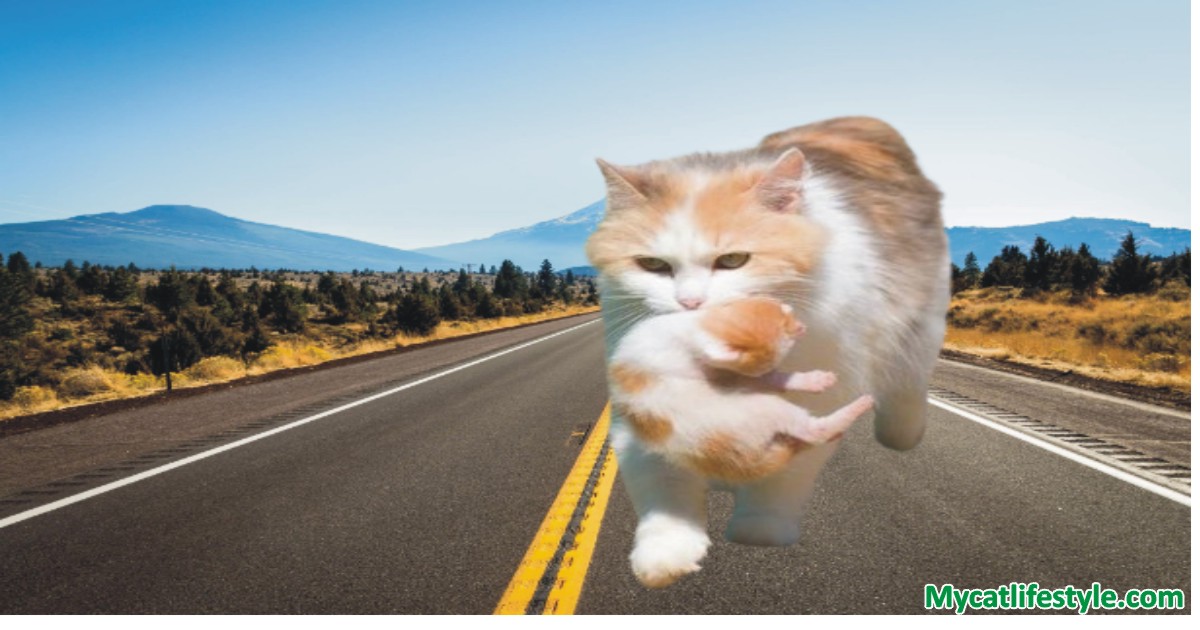
Cats have a variety of reasons for moving their kittens, each one rooted in their instinctive behavior and care for their offspring. Let’s dive into these reasons:
- Defending Against Predators
- Separating From Other Cats
- Teaching Surviving Knowledge
- Seeking Quiet and Comfortable
- Kittens are Mature Enough
- She’s Still Giving Birth
- Providing a Clean Environment
- A Warmer Environment
- Maternal Violence
- The Kitten Seems to Have a Medical Condition
Understanding these reasons helps us empathize with our feline friends and their maternal instincts. Each action of a mother cat is a step towards ensuring her kittens’ safety, health, and well-being. In the next sections, we’ll look at how we, as cat owners, can support our cats through this critical phase of kitten-rearing.
Why Does My Cat Separate Her Kittens?
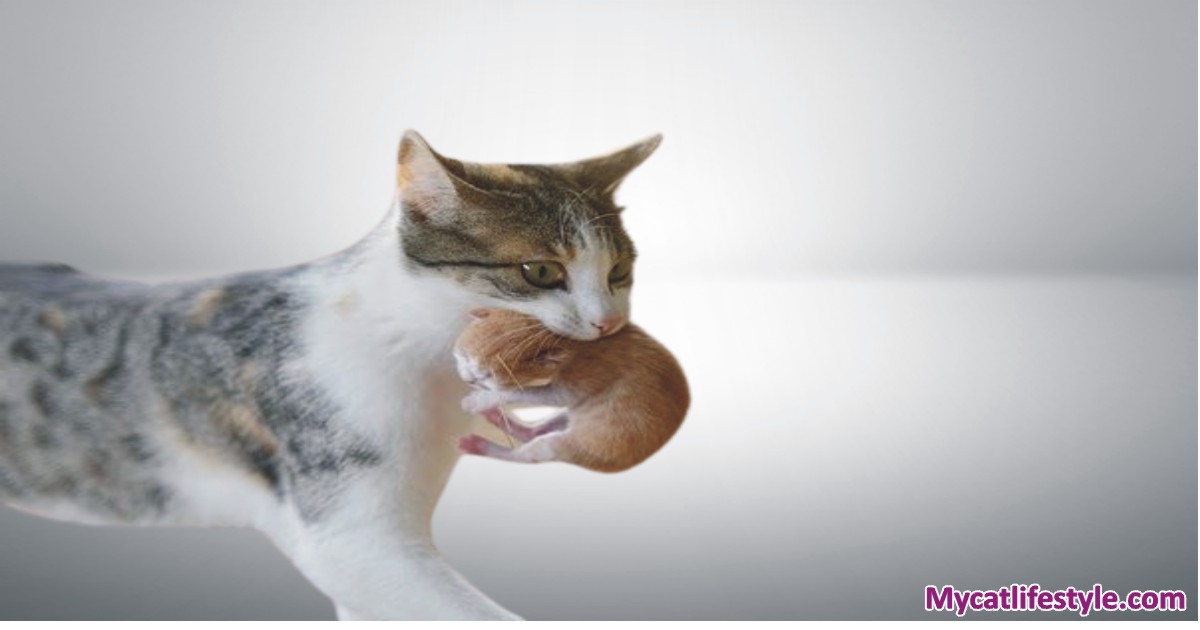
When a mother cat starts separating her kittens, it can be puzzling, and sometimes concerning, for us as pet owners. But there’s usually a good reason behind this behavior. Understanding why she does this can help us ensure that both the mother and her kittens are healthy and happy.
- Preventing Overcrowding:
- Health Concerns
- Teaching Independence:
- Stress and Anxiety:
- Weaning Process:
- Individual Attention
As cat owners, it’s important to observe these behaviors and provide support where needed. Ensuring a calm, safe environment for the mother cat and her kittens can help minimize stress and promote healthy development. In our next sections, we’ll continue to explore more about the fascinating world of mother cats and their kittens.
Why Does My Cat Keep Bringing Me Her Kittens?

When a mother cat brings her kittens to you, it’s not just adorable, it’s also a significant sign of trust and communication. Understanding why she does this can deepen the bond between you and your feline family. Here are some reasons:
- Seeking Safety and Protection
- Asking for Help
- Showing Off Her Kittens
- Teaching Her Kittens About You
- Seeking Comfort or Reassurance
- Health Concerns
In each of these cases, the mother cat’s behavior is a sign of her trust in you and her comfort with her environment. It’s important to respond positively, providing the support she needs without overwhelming her or her kittens. Ensuring a quiet, safe space for her and her kittens and consulting a vet if you suspect health issues are good ways to support her.
My Cat Moved Her Kittens and Can’t Find Them
It can be quite concerning when you realize that your cat has moved her kittens and now seems unable to find them. This situation, while not very common, can happen, particularly with inexperienced mother cats or in a chaotic home environment. But don’t worry, there are practical steps you can take to resolve this.

The first thing to do is to start a calm and thorough search around your home. Cats usually choose hidden and quiet spots to place their kittens, such as under beds, inside closets, or even in seldom-used drawers or cupboards. So, check these sorts of places first. Listen for any tiny kitten meows – these can be a giveaway. Remember, kittens themselves are not very mobile in the early days, so they are likely to be somewhere close by where the mother cat frequents.
If this initial search doesn’t turn up the kittens, broaden your search area. Go through each room, look behind furniture, inside boxes, and any other small spaces where kittens might crawl into. Once you locate them, gently bring them back to their mother. After this, to prevent the situation from happening again, consider setting up a safe and enclosed space for the mother and her kittens. This will give the mother cat a secure place to care for her kittens and reduce the likelihood of her moving them to hard-to-find spots.
How to Stop a Cat from Moving Her Kittens
Preventing a cat from constantly moving her kittens is all about making her feel secure and comfortable in her current environment. By addressing her basic needs and instincts, you can help her settle down with her kittens in one safe spot. Here are some effective strategies:
Avoid Handling Kittens:
It’s tempting to want to cuddle those adorable little furballs, but try to resist the urge. Frequent handling of kittens by humans can make the mother cat anxious or stressed, leading her to move them to a place she deems safer. Limit handling, especially during the first few weeks, to allow the mother and kittens to bond and feel secure.
Keep Territory Clean, Warm, and Quiet:
Create an ideal nesting area that caters to a cat’s love for cleanliness, warmth, and tranquility. Ensure the space is clean, free from drafts, and at a comfortable temperature. It should also be in a quiet part of your home, away from the hustle and bustle of daily activities. This kind of environment reassures the mother cat that her kittens are in a safe place.
Monitor Health of Mother and Kittens:
A mother cat might move her kittens if she senses that they or she is not in good health. Regularly check the health of both the mother and the kittens. Look for signs of feeding and healthy growth in the kittens, and ensure the mother is eating well and doesn’t show signs of illness or distress. If you notice any health issues, consult a veterinarian promptly.
By respecting the mother cat’s space, providing a suitable environment, and keeping an eye on their health, you can minimize her instinct to constantly move her kittens. This approach not only keeps the kittens safe but also strengthens the trust between you and your cat, enhancing your bond with the entire feline family
Why the Mom Cat Doesn’t Like her Kitty Place?
Sometimes, despite your best efforts to create the perfect spot for a mother cat and her kittens, she might not take to it. Understanding why she’s not keen on the spot you’ve chosen can help you make necessary adjustments. Here are some common reasons:
- Location Issues:
- Comfort and Safety Concerns:
- Temperature Sensitivity:
- Not Enough Space:
- Change in Routine or Environment:
- Personal Preference:
In response, observe her behavior to understand her preferences, and try adjusting the nesting area accordingly. Sometimes, it’s about trial and error until you find a spot that she’s happy with. Remember, her comfort and the safety of the kittens are paramount, so being flexible and patient is key.
Frequently Asked Questions
Cat moving kittens 2 weeks old, why?
At around two weeks, kittens start to become more active and their eyes open. The mother cat might move them to a new location to accommodate their increasing mobility and curiosity, or to protect them as they become more aware of their surroundings.
Why does my cat keep bringing me her kittens?
This behavior is often a sign of trust. The mother cat might bring her kittens to you as she sees you as a protector or as part of her extended family. She could also be seeking your attention for herself or her kittens, possibly for care or reassurance.
Why does my cat separate her kittens?
A mother cat may separate her kittens to manage overcrowding, to focus on weaker or sickly kittens, or as part of the weaning process. It’s also a way to teach them independence as they grow.
My cat moved her kittens and can’t find them.
This can happen if the mother cat is stressed, inexperienced, or if there has been a disruption in her environment. It’s important to search calmly and gently guide her back to her kittens once found.
Can A cat forget where she put her kittens?
It’s rare but possible, especially with inexperienced or stressed mother cats. Environmental changes or disturbances can also contribute to this.
Will cats move their kittens if you touch them?
Some mother cats might move their kittens if they sense a change in their scent after being touched by humans, especially if they are not fully comfortable with human interaction. However, this is not a rule, and many domesticated cats are fine with their trusted humans handling their kittens.
Do outdoor cats move their kittens more often than indoor cats?
Yes, outdoor cats might move their kittens more frequently due to the increased risks and variables in an outdoor environment, such as predators, weather conditions, and human interference. Indoor cats, in a controlled environment, may feel less need to do so.
In wrapping up
In wrapping up, understanding why cats move their kittens is a fascinating glimpse into the natural instincts and maternal behavior of these beloved pets. From seeking safety and comfort to ensuring the health and well-being of their young, every action of a mother cat is guided by her instincts and her environment.
As cat owners, it’s crucial to provide a safe, quiet, and comfortable space for mother cats and their kittens. This not only helps in minimizing the mother cat’s stress but also aids in the healthy growth and development of the kittens. Remember, patience and a gentle approach is key. Every cat is different, and what works for one may not work for another.
By understanding and respecting these natural behaviors, we deepen our bond with our feline friends and ensure a harmonious and happy coexistence. Whether you’re a seasoned cat owner or new to the world of feline parenting, this knowledge is invaluable in nurturing and caring for your furry family members.

